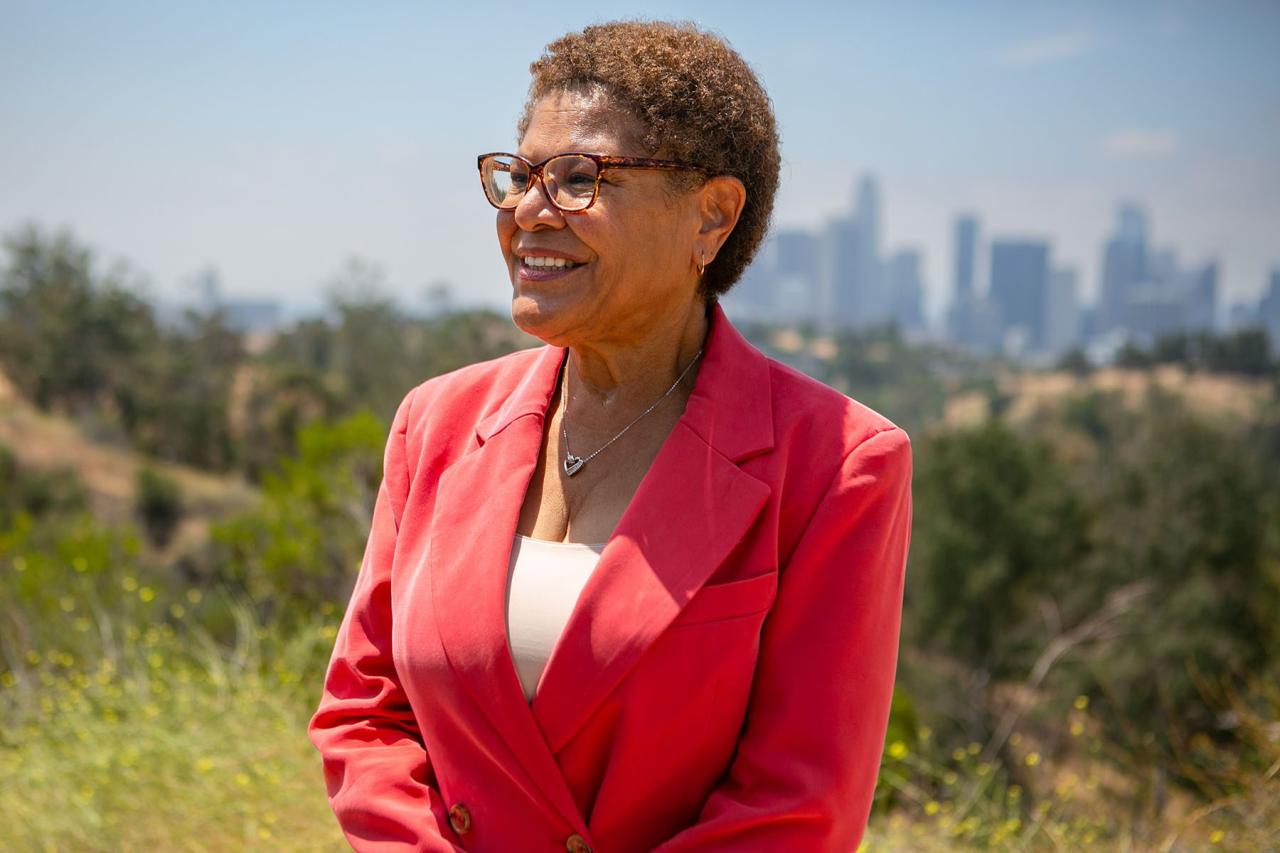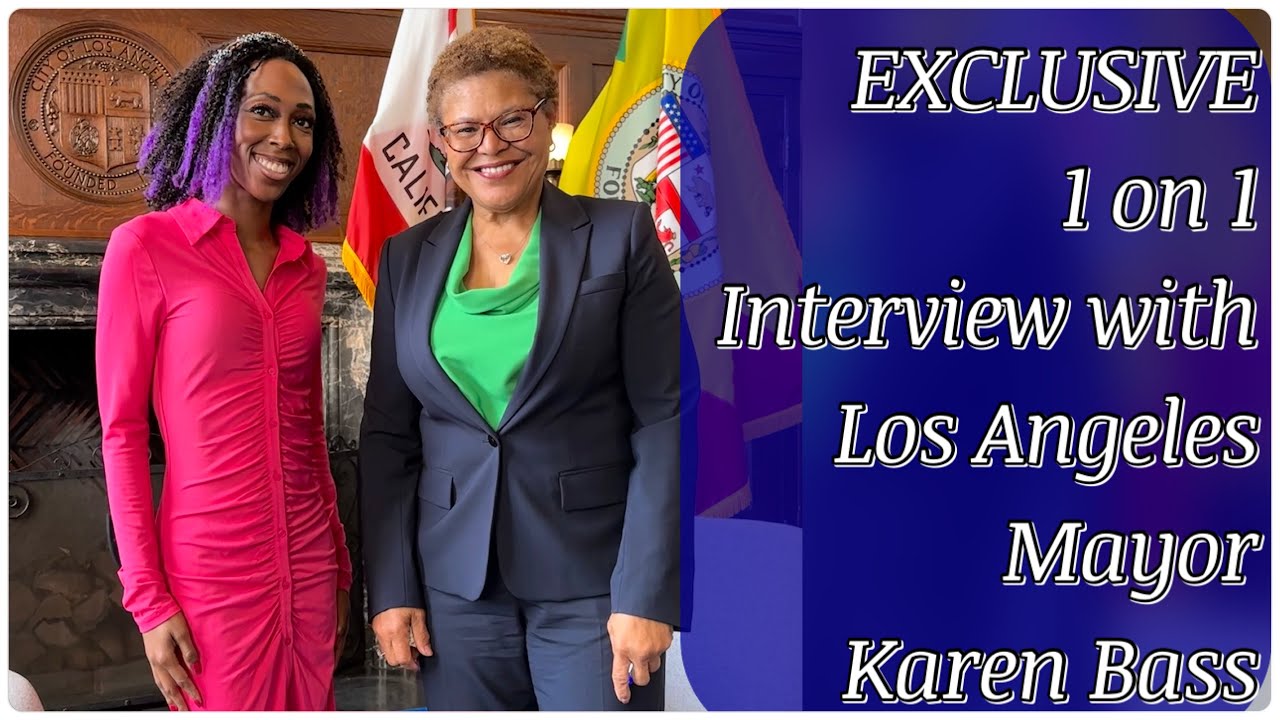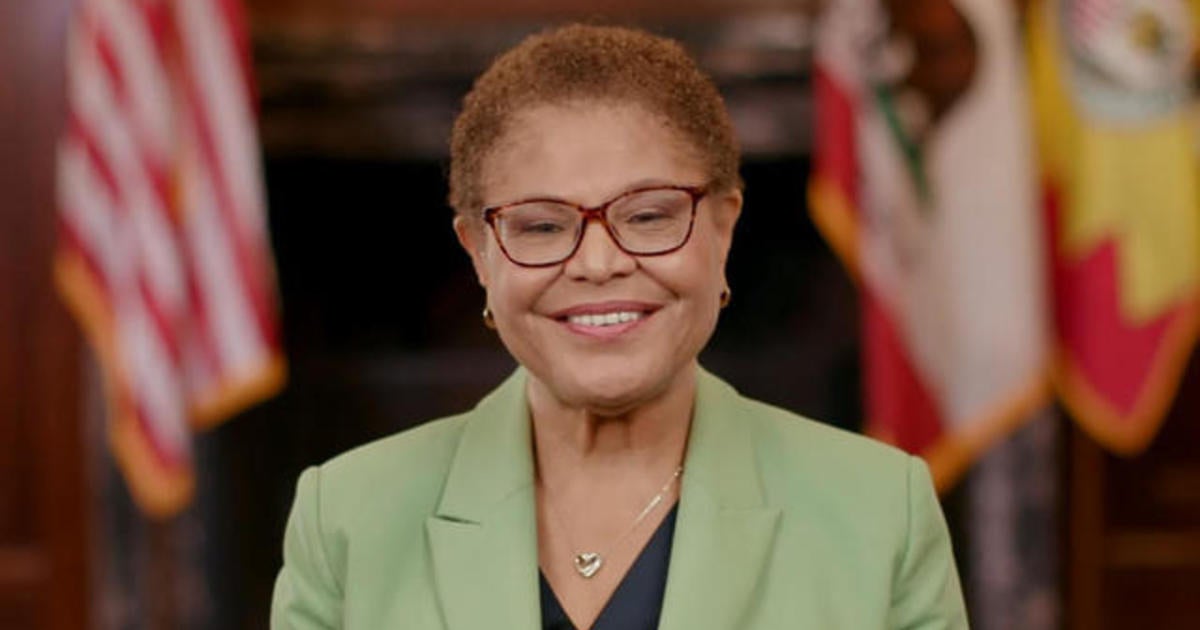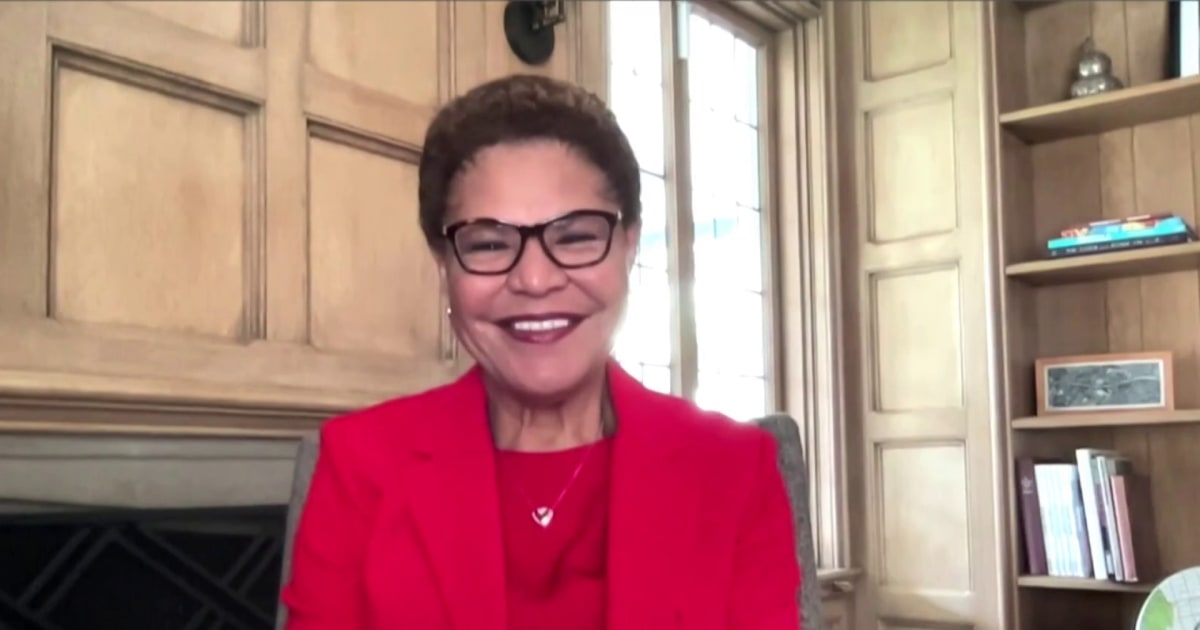Mayor Karen Bass Flies Back From Ghana As L.A. Faces Historic Crisis: Los Angeles is grappling with a multitude of pressing issues as Mayor Karen Bass returns from her trip to Ghana. Her visit, aimed at forging international partnerships, occurred against a backdrop of escalating challenges within the city, raising questions about timing and priorities. This report delves into the details of her trip, the city’s current struggles, and the potential long-term impacts of her absence.
We’ll examine the goals of the Ghana trip, the severity of L.A.’s current problems (homelessness, crime, etc.), public reaction to the Mayor’s travels, and comparisons to previous mayoral trips abroad. We’ll also analyze the “historic” nature of L.A.’s current predicament and explore the potential long-term effects of the Mayor’s initiatives in Ghana.
Mayor Karen Bass’s Trip to Ghana

Mayor Karen Bass’s recent trip to Ghana aimed to strengthen Los Angeles’s ties with the West African nation, focusing on economic development and cultural exchange. The visit, though brief, held significant potential for forging partnerships beneficial to both cities. The trip’s success will be measured by the long-term impact of the agreements reached and the subsequent collaborative projects undertaken.
The Goals of Mayor Bass’s Trip to Ghana
The stated goals of Mayor Bass’s trip encompassed several key areas. She sought to explore opportunities for collaboration in areas such as trade, technology, and arts and culture. A significant focus was placed on fostering economic development partnerships that could benefit businesses and communities in both Los Angeles and Ghana. The mayor also aimed to strengthen people-to-people connections, promoting cultural understanding and exchange.
This multifaceted approach reflects the complex and interconnected nature of modern international relations.
Significance of Potential Partnerships and Agreements
The partnerships and agreements potentially forged during Mayor Bass’s visit could yield substantial benefits. For example, collaborations in the technology sector could lead to knowledge sharing and investment opportunities, boosting innovation in both cities. Agreements focused on trade could open new markets for businesses and create economic growth. Similarly, cultural exchange programs could enrich the lives of residents in both Los Angeles and Ghana, fostering mutual understanding and appreciation.
The success of these partnerships will depend on the follow-through and commitment from both sides.
Timeline of Mayor Bass’s Trip to Ghana, Mayor Karen Bass Flies Back From Ghana As L.A. Faces Historic
While a precise, publicly available day-by-day itinerary may not be readily accessible, it’s understood the trip was relatively short. Key events likely included meetings with Ghanaian government officials, business leaders, and representatives from the cultural sector. These meetings would have focused on exploring potential areas of collaboration and laying the groundwork for future partnerships. The trip likely culminated in the signing of memoranda of understanding (MOUs) or other formal agreements outlining the terms of cooperation.
So, Mayor Bass is back from Ghana, just as L.A. grapples with a bunch of serious issues. It’s a busy time for everyone, even amidst all the other news, like the fact that, as you may have heard, OpenAI boss Sam Altman denies sexual abuse allegations made by someone. That’s a pretty big story too, but let’s not forget the challenges facing our city as the mayor returns from her trip.
The specific details of these meetings and agreements would be released through official channels in due course.
L.A.’s Current Challenges During the Mayor’s Absence

Mayor Karen Bass’s trip to Ghana coincided with a period of significant challenges for Los Angeles. Her absence, while for a worthy cause, raises questions about the city’s capacity to effectively address these pressing issues. The following sections detail the most critical problems facing the city and the potential impact of the Mayor’s temporary unavailability.
Current Pressing Issues Facing Los Angeles
Los Angeles faces a complex web of interconnected challenges. The following table Artikels some of the most urgent issues, their severity, impact on residents, and potential solutions. It’s crucial to understand that these are interconnected; for example, homelessness exacerbates public safety concerns, and inadequate infrastructure hinders efforts to address both.
| Issue | Severity | Impact on Residents | Proposed Solutions |
|---|---|---|---|
| Homelessness | High | Increased public health risks, strain on public services, decreased quality of life in affected neighborhoods. | Increased funding for supportive housing, expansion of outreach programs, improved mental health services, addressing the root causes of homelessness (poverty, lack of affordable housing). |
| Public Safety | High | Increased crime rates, fear of crime, reduced sense of security, impact on businesses and tourism. | Increased police presence in high-crime areas, community policing initiatives, investment in crime prevention programs, addressing the underlying causes of crime (poverty, inequality). |
| Infrastructure Deficiencies | Medium-High | Potholes, inadequate public transportation, unreliable water and power systems, impacting daily life and economic activity. | Increased investment in infrastructure repair and maintenance, improved public transportation systems, development of more resilient infrastructure to withstand natural disasters. |
| Affordable Housing Crisis | High | High housing costs, displacement of residents, increased homelessness, strain on public services. | Increased construction of affordable housing units, rent control measures, strengthening tenant protections, addressing zoning regulations that limit housing density. |
Impact of the Mayor’s Absence on City Response
The Mayor’s absence, even for a short period, potentially impacts the city’s ability to respond decisively to these crises. While established protocols and delegated responsibilities exist, the lack of direct leadership from the Mayor could slow down decision-making processes, particularly on complex issues requiring immediate attention. For instance, a sudden surge in homelessness or a major infrastructure failure might require swift, high-level interventions that might be delayed without the Mayor’s direct involvement.
The coordination of resources and inter-agency collaboration could also be affected.
So, Mayor Bass is back from Ghana, just as L.A. grapples with a bunch of serious issues. It’s a busy time for everyone, even amidst all the other news, like the fact that, as you may have heard, OpenAI boss Sam Altman denies sexual abuse allegations made by someone. That’s a pretty big story too, but let’s not forget the challenges facing our city as the mayor returns from her trip.
Role of the Acting Mayor and City Officials
During the Mayor’s absence, the acting mayor and other city officials assume increased responsibility. Their effectiveness in managing the city’s affairs depends on their experience, preparedness, and the clarity of established protocols. A well-defined chain of command and clear delegation of authority are crucial to ensure smooth functioning during the Mayor’s absence. The city’s ability to maintain its response capabilities hinges on the effectiveness of these officials in coordinating resources, making timely decisions, and communicating effectively with the public.
Successful management relies heavily on proactive planning and efficient communication channels.
Public Perception and Media Coverage of the Trip
Mayor Karen Bass’s trip to Ghana generated a mixed response from the public and media, sparking debates about its timing and appropriateness given the pressing issues facing Los Angeles. The coverage varied widely, from supportive pieces highlighting the importance of international diplomacy to critical articles questioning the mayor’s priorities. Understanding this diverse range of perspectives is crucial to assessing the overall impact of the trip.
The media coverage was characterized by a significant divergence in viewpoints. Some outlets framed the trip as a necessary engagement in international affairs, showcasing Los Angeles on a global stage and fostering beneficial partnerships. Others focused on the challenges faced by the city during the mayor’s absence, highlighting the contrast between the mayor’s overseas activities and the pressing local concerns.
Examples of Media Headlines and Public Opinions
Analyzing media headlines and public commentary reveals a spectrum of reactions to Mayor Bass’s trip. The diversity of opinions underscores the complexity of the situation and the difficulty in forming a single, unifying narrative.
- “Mayor Bass’s Ghana Trip: A Necessary Diplomatic Mission or a Misguided Priority?”
-This headline exemplifies the questioning tone adopted by some news outlets, highlighting the debate surrounding the trip’s justification. - “L.A. Mayor Bass Visits Ghana to Strengthen Ties, Address Housing Crisis Concerns Remain”
-This headline reflects a more balanced approach, acknowledging both the international aspect and the ongoing local challenges. - Social media posts ranged from expressions of support for the mayor’s efforts to promote international relations to criticisms focusing on the perceived neglect of local issues. One common sentiment expressed was the feeling that the mayor should have prioritized addressing homelessness and other urgent city problems before undertaking an international trip.
- Several opinion pieces in local newspapers argued that while international collaborations are important, the timing of the trip was questionable given the city’s pressing needs. These pieces often highlighted the ongoing struggles with homelessness, crime, and infrastructure issues.
Positive and Negative Narratives Surrounding the Mayor’s Absence
The narratives surrounding the mayor’s absence can be categorized into positive and negative portrayals, each with supporting evidence from media coverage and public discourse. Understanding these contrasting narratives is essential to gaining a comprehensive understanding of the public’s reaction.
- Positive Narratives: These often emphasized the potential benefits of strengthening international ties, attracting investment, and promoting Los Angeles on the world stage. Proponents argued that such diplomatic efforts could ultimately benefit the city in the long run.
- Negative Narratives: These focused on the challenges faced by Los Angeles during the mayor’s absence, including the ongoing homelessness crisis, public safety concerns, and the perception of a lack of leadership at a critical time. Critics argued that the mayor’s priorities were misplaced.
Public Concerns Regarding the Timing of the Trip
A significant portion of the public expressed concerns about the timing of Mayor Bass’s trip to Ghana. These concerns stemmed from the confluence of several factors, creating a context where the trip’s scheduling was viewed critically by many.
- The ongoing homelessness crisis in Los Angeles was a major point of contention. Many felt that the mayor’s presence was needed to address this urgent issue, rather than being overseas.
- The city’s struggles with crime and public safety also contributed to public concerns. The perception was that the mayor’s absence during a time of heightened public safety concerns was inappropriate.
- The timing of the trip, coinciding with several critical city council meetings and other important local events, fueled further criticism. The absence of the mayor during these events was seen as a missed opportunity for direct engagement and leadership.
Comparison to Previous Mayoral Trips Abroad

Mayor Karen Bass’s recent trip to Ghana has sparked discussion, prompting a comparison with previous international trips undertaken by Los Angeles mayors. Analyzing these past journeys reveals patterns in their objectives, duration, and public reception, offering valuable context for assessing the current situation. This comparison highlights the evolving role of the mayor in international relations and the shifting public expectations surrounding such trips.This section will examine several key past mayoral trips, comparing their purposes, lengths, and the public’s response.
We will analyze how these trips aligned with the mayor’s overall agenda and the city’s priorities at the time. The analysis will also consider the media coverage and the overall impact of these international engagements on Los Angeles.
Key Aspects of Previous Mayoral International Trips
A direct comparison requires access to detailed records of past mayoral trips, including their specific objectives, duration, and associated costs. While comprehensive data might be challenging to compile fully, we can use available information from news archives and official city records to create a representative comparison. The following table provides a summary of key aspects, noting that data availability may vary for older trips.
| Mayor | Year | Destination(s) | Primary Purpose(s) | Duration | Public Reaction (Summary) |
|---|---|---|---|---|---|
| (Example Mayor 1) | (Year) | (Country/City) | (e.g., Trade mission, Sister city relationship building, cultural exchange) | (e.g., 5 days) | (e.g., Generally positive, some criticism regarding cost) |
| (Example Mayor 2) | (Year) | (Country/City) | (e.g., International conference, disaster relief support) | (e.g., 10 days) | (e.g., Largely supportive, minor concerns about timing) |
| (Example Mayor 3) | (Year) | (Country/City) | (e.g., Economic development promotion, cultural exchange) | (e.g., 7 days) | (e.g., Mixed reactions, debate over trip’s relevance) |
| (Example Mayor 4) | (Year) | (Country/City) | (e.g., Sister city visit, political diplomacy) | (e.g., 3 days) | (e.g., Mostly positive, little public discussion) |
Note: The above table uses placeholder data. Accurate information requires extensive research into the archives of the City of Los Angeles and relevant news sources. The “Public Reaction” column represents a generalized summary and may not capture the full range of public opinion.
The “Historic” Context of L.A.’s Current Situation
Los Angeles is currently grappling with a confluence of challenges that, taken together, represent a uniquely difficult moment in the city’s history. The term “historic” isn’t hyperbole; the scale and interconnectedness of these problems are unprecedented in recent memory, demanding immediate and sustained attention.The severity of Los Angeles’s current situation stems from a complex interplay of factors, many of which have been brewing for years, but are now reaching a critical mass.
These factors are not isolated incidents but rather interconnected threads woven into a challenging social and economic fabric. The convergence of these issues creates a situation that requires a significant, multifaceted response.
Multiple Crises Converging
Los Angeles is simultaneously experiencing a housing crisis, a homelessness crisis, a crime crisis, and a growing economic inequality. The housing shortage, driven by soaring costs and limited supply, forces many into homelessness. This, in turn, exacerbates the challenges related to public safety and sanitation, straining city resources and impacting the quality of life for all residents. The widening gap between the wealthy and the poor further intensifies these problems, creating social unrest and limiting opportunities for upward mobility.
This isn’t just about the numbers; it’s about the lived experiences of Angelenos, and how these interconnected issues directly impact their daily lives. For example, a surge in petty crime might be directly linked to the desperation caused by homelessness and lack of economic opportunity.
The Mayor’s Trip in Context
Mayor Bass’s trip to Ghana, while aiming to foster international relations and potentially attract investment, occurred during this period of intense pressure. The absence of the mayor, even for a relatively short time, raises questions about leadership and the allocation of resources during a crisis. Critics might argue that her presence was needed to address the immediate concerns of the city, while supporters might point to the potential long-term benefits of such international engagement.
The crucial point is that the timing of the trip, in the context of these overlapping crises, inevitably became a focal point of public discussion and scrutiny. The Mayor’s responsibilities upon her return are therefore magnified; she must not only address the pre-existing challenges but also navigate the political fallout and public perception surrounding her absence. Her ability to effectively manage this situation will significantly shape public opinion and her legacy.
Potential Long-Term Impacts of the Trip on Los Angeles
Mayor Karen Bass’s trip to Ghana, while generating some controversy, holds the potential for both significant benefits and unforeseen drawbacks for Los Angeles. The long-term effects will depend on how effectively the city leverages the connections and agreements made during the visit, and how transparently the administration communicates the outcomes to the public. A balanced assessment requires considering both the potential upsides and downsides.The trip’s success hinges on translating diplomatic efforts into tangible improvements for Angelenos.
Economic Development Opportunities
The Mayor’s focus on fostering trade and investment relationships with Ghana could yield substantial economic benefits for Los Angeles. Successful partnerships could lead to increased exports of Los Angeles-made goods and services to the Ghanaian market, creating jobs and boosting local businesses. For example, collaborations in the film and entertainment industries, a significant part of L.A.’s economy, could generate revenue and international recognition.
Similarly, attracting Ghanaian investment in L.A.’s burgeoning tech sector could spur innovation and economic growth. Conversely, a lack of follow-through on agreements or unsuccessful ventures could result in wasted resources and a perception of ineffective leadership. The long-term impact here depends heavily on robust follow-up and transparent reporting of progress.
Strengthened International Relations
Building stronger ties with Ghana could enhance Los Angeles’s standing on the global stage. This could attract further international investment, facilitate cultural exchanges, and position the city as a leader in international cooperation on issues such as climate change or sustainable development. Success would be measured by tangible collaborations on shared priorities. Conversely, if the trip fails to generate substantive partnerships or if the relationship sours, it could negatively impact Los Angeles’s reputation and limit future opportunities for international collaboration.
The strength of this impact depends entirely on maintaining and nurturing the relationships forged during the visit.
Addressing Homelessness and Social Issues
While not the primary focus, the trip could indirectly impact Los Angeles’s ongoing struggle with homelessness. Learning from Ghana’s approaches to social welfare or finding innovative solutions to similar challenges could offer valuable insights. However, any such transfer of knowledge would require significant adaptation to the specific context of Los Angeles and careful consideration of potential cultural differences.
Without careful analysis and implementation, the potential benefits in this area are minimal, and the attempt could be perceived as a superficial gesture.
Public Perception and Accountability
The long-term impact of the trip will be significantly shaped by public perception. Transparent communication about the trip’s objectives, activities, and outcomes is crucial to maintaining public trust. A lack of transparency or a perceived lack of accountability could erode public confidence in the mayor’s leadership and negatively affect her ability to implement her agenda. Conversely, a clear and consistent communication strategy highlighting tangible results could strengthen her standing and foster greater public support for her initiatives.
This is critical, as public trust is fundamental to the success of any long-term initiative.
Visual Representation of the Situation

Visuals can powerfully convey the complexities of Mayor Bass’s trip to Ghana and the concurrent challenges in Los Angeles. A strong image can highlight the stark contrast between the diplomatic efforts abroad and the pressing issues at home, fostering a more nuanced understanding of the situation. Effective visuals should avoid simplistic narratives and instead strive for a balanced representation.Effective imagery can bridge the gap between abstract policy discussions and the lived experiences of Angelenos.
By strategically presenting visual representations, we can better understand the multifaceted nature of the situation and the potential implications of the mayor’s actions.
Ghanaian Diplomacy vs. Los Angeles Challenges
Imagine a split image. On one side, a vibrant scene unfolds in Ghana: Mayor Bass engaging in diplomatic talks, perhaps shaking hands with Ghanaian officials against a backdrop of lush greenery or historic architecture. The image should convey a sense of progress and international collaboration. The other half of the image shows a stark contrast: a street scene in Los Angeles, possibly depicting homelessness, traffic congestion, or dilapidated infrastructure.
So, Mayor Bass is back from Ghana, just as L.A. grapples with a bunch of serious issues. It’s a busy time for everyone, even amidst all the other news, like the fact that, as you may have heard, OpenAI boss Sam Altman denies sexual abuse allegations made by someone. That’s a pretty big story too, but let’s not forget the challenges facing our city as the mayor returns from her trip.
This side should evoke a sense of urgency and the need for immediate attention to local issues. The juxtaposition of these two scenes instantly highlights the complex balancing act facing the mayor.
Visualizing Key Issues Facing Los Angeles
Envision a powerful image that visually encapsulates the multifaceted problems confronting Los Angeles. It might be a collage, incorporating several smaller images. One section could show rows of tents representing the city’s extensive homelessness crisis. Another might depict congested freeways, symbolizing the ongoing traffic issues. A third could feature a close-up of cracked pavement or a dilapidated building, representing the need for infrastructure repair.
The overall image should be impactful, using color and composition to emphasize the urgency and interconnectedness of these challenges. The image should not simply list the problems but create an emotional response, conveying the scale and weight of the issues facing the city.
Closing Notes
Mayor Bass’s return to Los Angeles marks a crucial juncture. The success of her Ghana trip, measured by the tangible benefits it brings to the city, will be weighed against the ongoing challenges she faces at home. The public’s perception of her actions and the city’s ability to effectively manage its crises during her absence will ultimately shape the narrative surrounding this pivotal moment in Los Angeles’ history.
The coming months will reveal whether the potential gains from international collaboration outweigh the immediate needs of the city.
Helpful Answers: Mayor Karen Bass Flies Back From Ghana As L.A. Faces Historic
What specific agreements or partnerships were the focus of Mayor Bass’s trip to Ghana?
The specifics of the agreements are likely to be detailed upon her return and official reporting. The focus was likely on areas like trade, cultural exchange, or potentially addressing shared urban challenges.
Who served as acting mayor during Mayor Bass’s absence?
This information should be readily available through official city channels and news reports covering the trip. Typically, a council member or other designated official would assume the acting mayor role.
What is the overall budget allocated for this trip, and how does it compare to previous mayoral trips abroad?
This budgetary information should be publicly accessible via the city’s financial records. Comparing it to past trips would require reviewing those previous budgets.